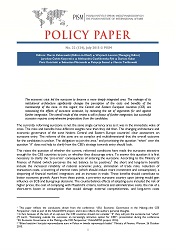№039: Visegrad’s Winding Road to the EU Multiannual Financial Framework 2014–2020
№039: Visegrad’s Winding Road to the EU Multiannual Financial Framework 2014–2020
Author(s): Dariusz Kałan, Paweł Tokarski, Patryk Toporowski
Subject(s): Governance, Economic policy, International relations/trade, Geopolitics
Published by: PISM Polski Instytut Spraw Międzynarodowych
Keywords: EU budget; Visegrad Group; budget; Czech Republic; Euro; European Union; Hungary; Poland; Slovakia
Summary/Abstract: The next Multiannual Financial Framework (MFF) of the EU is taking shape amidst uncertainty about the future of the Eurozone. The crisis of the common European currency overshadows the bargaining over the MFF, and impacts the calculations of the countries constituting the Visegrad Group—the Czech Republic, Hungary, Poland and Slovakia—or the V4, during the negotiations. Each member of the V4 has a deeply embedded interest in upholding the prominence and extent of EU’s cohesion policy in the years to come. In the light of the attempts to put a cap on this budget figure, a natural convergence of interests and positions would seem natural. Still, as authors of the analysis point out, the economic outlook of particular V4 countries, their political and economic partners of choice on the European level, as well as their respective visions of the future of European integration, are bearing heavily on their actual policies during the MFF negotiations. The V4 as a whole stands to gain only if individual members will be able to navigate the existing or emerging differences. If these differences prevail, and one of the countries breaks rank in search of a better negotiating position, the V4 is likely to arrive at suboptimal results at best.
Series: PISM Policy Papers
- Page Count: 39
- Publication Year: 2012
- Language: English
- Content File-PDF

